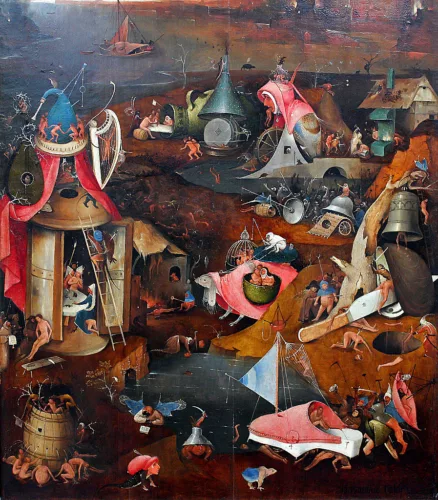Nymphs, elves, gods and goats
They wait, crammed behind misty wings.
No clapperboard,
just the look that you look
To start the motionless dances.
Wax statues wink at rocky mists,
electric impetuses pop
While Venus, smiling, files her nails.
Pan runs and stops,
He laughs, he cries, he screams to hear himself scream, and then,
He slumbers, exhausted of himself.
The endless days of mathematics shorten their robes,
and a sassy group of flamenco dancers,
Gasping at the onset of emotion,
Is holed up in the useless hubbub of Echo.
An immense spark on the tip of a hair
Blinds Polyphemus frozen on the rocks,
While the dreamy Ulysses,
With victory on the bow,
shamelessly sets out
Into the arms of sublime damnation.
Paradise, dusty,
waits patiently for the clueless patrons.
Deposited for legal protection with Patamu: certificate
Video
A brief note about the Greek mythological character Pan
The Greek mythological creature Pan was known for his mischievous behavior and unique character. He was often depicted as half human and half goat, with horns on his head and a long, shaggy tail. Pan was not only a creature but was also considered a god of wilderness, shepherds, and rustic music. His relationship with other gods was complex, as he was often seen as a companion and follower of Dionysus, the god of wine and revelry. Pan’s mischievous nature made him a favorite of the gods, who often enjoyed his company during their escapades.
However, Pan was deeply afraid of his scream. Legend says that when Pan accidentally saw his own reflected image, he let out a cry of surprise and terror. The sound was so immense and terrifying that it caused terror among the gods and even inspired the word “panic.” From then on, Pan vowed never to scream again, fearing the chaos and destruction it might cause.
This fear of his scream has shaped Pan’s behavior and character in various ways. He became known for his whispering voice and was often depicted gently playing his beloved Pan flute, which emitted gentle, melodic melodies. Pan’s fear of his cry also made him acutely aware of the power of sound, leading him to become an expert in the art of music and harmonious melodies. He used his music to soothe and calm humans and animals, creating a sense of tranquility in the wilderness.
Pan is strongly connected with nature despite his fear and shepherds and hunters revere him. He was believed to roam the mountains and forests, protecting the natural world and guiding lost travelers. Pan’s unique character and close relationship with the gods made him an intriguing figure in Greek mythology, symbolizing nature’s wild and unpredictable forces.
In conclusion, Pan’s spiteful behavior, fear of his screaming, and relationship with the other gods showcased his complex character. Although he was known for his playful nature, his fear of causing chaos through his shouting highlighted his cautious side. Pan brought harmony and tranquility to the wilderness through his music and connection with nature, making him an enigmatic and beloved god in Greek mythology.
If you like this poem, you can always donate to support my activity! One coffee is enough!


